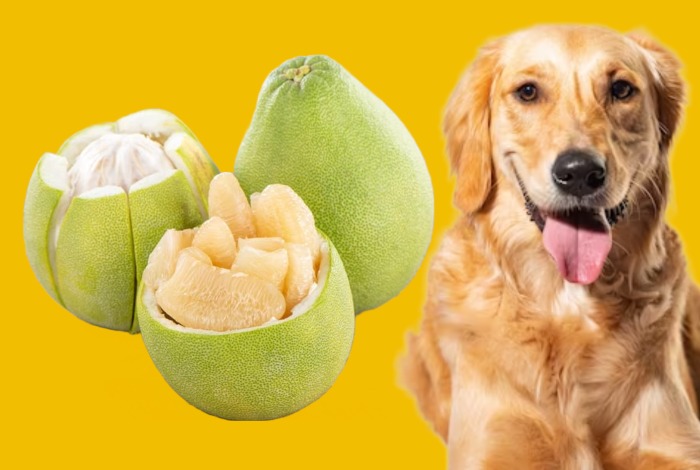Pomelo is an Asian citrus fruit with a lemony flavor. It is huge and looks something like a grapefruit. People often question if dogs can eat pomelo because of its resemblance to grapefruit in appearance. The good news is that while pomelo is safe for dogs, grapefruit is not. Pomelo is not the ideal food for dogs to consume, despite the fact that they won’t get hurt if they eat it.
This quick tutorial will discuss the advantages, hazards, and whether dogs should regularly consume pomelo.
What is Pomelo?
Pomelo is a citrus fruit with a grapefruit-like appearance. In fact, it’s occasionally referred to as “Chinese grapefruit.” The terms “pommelo,” “pumelo,” and “shaddock” are also used. These fruits can become very large. The majority are about the size of grapefruits, but some are bigger than watermelons! Pomelo tastes sweeter than grapefruit and has lemony undertones.
Can Dogs Eat Pomelo?
Yes!” Pomelo is safe for dogs. Dogs will typically be fine if they accidentally consume pomelo flesh or if they receive some scraps that include pomelo. However, intentionally feeding pomelo to dogs is not advised. The reason is that pomelo contains a lot of sugar and that other benefits may easily be found in foods that are more appropriate for dogs.
But if a dog eats a pomelo, there won’t be any immediate negative consequences or toxicological reactions.
Pomelo vs. Grapefruit
Due to pomelo’s resemblance to grapefruit, people frequently worry about it. Because grapefruit’s acidity is so harsh on dogs’ stomachs, dogs should never consume it. In some areas, pomelo is even referred to as Chinese grapefruit. Southeast Asia is its natural habitat. Dogs are poisoned by grapefruit peel and plant matter. Pomelos are far kinder and safer for dogs than grapefruit, despite their size and shape resemblance to the latter. Pomelo and grapefruit are not the same, and they each have unique hazards and advantages.
Health Benefits of Pomelo for Dogs
Although pomelo is okay for dogs to eat, is it nutritious? Yes, in modest amounts! Protein, fiber, riboflavin, thiamine, vitamin C, copper, and potassium are all abundant in it.
- Adding additional fiber to your dog’s diet may improve digestion and promote regularity. The protein aids in the maintenance of your dog’s lean muscles.
- Pomelo also has the anti-oxidants naringenin and naringin, which aid in the battle against oxidative stress.
- Lycopene, another antioxidant found in pomelo, also reduces inflammation.
Additionally, investigations on animals have shown that pomelo extract can lower cholesterol and triglycerides.
Conclusion
You now know pomelo is safe for dogs in small quantities and can even have potential health benefits. Other, more secure sources than pomelo can provide your dog with the same advantages. You shouldn’t make a special effort to give your dog pomelo on a regular basis, but they will be fine if they unintentionally eat some or acquire leftovers of the fruit.
Frequently Asked Questions
Q: How much pomelo can a dog eat?
A: It’s best to give pomelo to dogs in moderation. While small amounts of pomelo flesh may be safe for dogs to consume, it’s important to remove the seeds and avoid giving them large quantities. Too much pomelo can cause digestive upset in dogs due to its high fiber content and acidity. Additionally, some dogs may have individual sensitivities or allergies to citrus fruits.
Q: What citrus can dogs not eat?
A: Dogs should generally avoid consuming citrus fruits, including oranges, lemons, limes, and grapefruits. Citrus fruits contain citric acid and essential oils that can be irritating to dogs’ digestive system, leading to gastrointestinal upset. The peels, seeds, and pith of citrus fruits can also pose a choking hazard or cause blockages in the digestive tract.
Q: Who should not eat pomelo?
A: Pomelo is generally safe for most humans to consume. However, individuals who are allergic to citrus fruits or have specific dietary restrictions should avoid eating pomelo. It’s always best to consult with a healthcare professional if you have any concerns about consuming pomelo or any other food.
Q: Is pomelo considered a grapefruit?
A: Pomelo and grapefruit are closely related citrus fruits, but they are not the same. Pomelo is the largest citrus fruit and has a sweet, mild flavor. Grapefruit, on the other hand, is smaller and has a more tangy and bitter taste. While they share some similarities, they have distinct characteristics and flavors.

